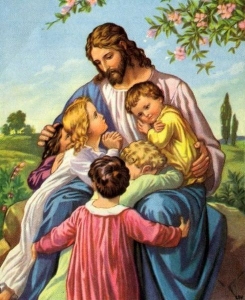
(click for credit)
As anyone familiar with the Bible probably knows, there was a time during the ministry of Jesus when children were brought to Him so that He could bless them. The disciples rebuked the children, but Jesus said:
Let the children alone, and do not hinder them from coming to Me; for the kingdom of heaven belongs to such as these. (Matthew 19:14)
Until reading this book, I had no idea what a radical statement that was in New Testament times. As Bakke documents in his book, children were not valued in Rome. Instead, they were not really considered human beings. For example, when a child was born, the father could refuse to accept him or her into the family. Indeed, the father generally had eight to nine days to consider the matter. If the father decided the child was worthy of being a member of the family, a ritual was held, celebrating the child’s good fortune. If not, the child was simply abandoned, a practice referred to as expositio. As Bakke informs us:
…as far as the Eastern region of the Roman empire was concerned, expositio was socially accepted and widespread from the time of Alexander the Great onward. (p. 29)
Expositio was not the only barbarism perpetuated on the most vulnerable members of society. Abortion was also widely accepted, as was the sexual exploitation of children. This is the part that left me disgusted. Brothels that specialized in using children (mostly boys) as sex slaves were legal businesses that did very well in Rome. Sex with castrated boys was considered particularly exciting, so abandoned boys who were “rescued” by brothels were often castrated so they could provide that experience for their clientele.
This is the culture in which Jesus appeared. His words regarding children were revolutionary, and not surprisingly, the early church fathers had a lot to say about those words. Clement of Alexandria, Origen, and John Chrysostom, for example, tell their readers that they should strive to become like children, for children have by nature many of the characteristics that are pleasing to God. In addition, every early church author Bakke could find who wrote about children explicitly denounced abortion, expositio, and sex with children. For that time and that region of the world, this represented a titanic cultural shift.
Not only did the early church writers condemn barbaric practices against children, they also encouraged their people to personally care for and educate their children. While most people with wealth would push the care of their children off to wet nurses and servants, the early church fathers made it clear that parents need to care for their children personally. They also encouraged parents to mold their children so they would grow up to be good people who knew God.
According to Bakke, the emphasis that the early church put on the dignity and worth of children was revolutionary. It radically transformed society’s view of children so that they became not only cherished, but also a source of inspiration for adults. Adults were admonished to care for children and strive to attain some of the attitudes found in them, such as innocence and a lack of worldly passion. As a result, Christianity improved the lives of children remarkably.
If you are at all interested in history and the transformative effect that Christianity has had in it, I strongly recommend this book to you.

Abortion, abandonment, and exploitation. There is nothing new under the sun.
Upon reading this, it occurred to me that “expositio” is still around, only now it’s called “pre-natal screening.”
I completely agree with your sentiments, concerning both the precious value of children and also our Lord’s love for them. However, some of the graphic elements in your post are not what I’d recommend for my 12 and 13-year old students (whom I sometimes recommend to visit your blog.) To your great credit, they are an anomaly compared to the vast bulk of your other posts over the years.